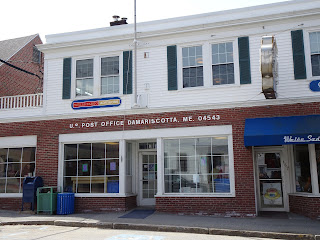 |
| From Camden Hills State Park, looking toward Penobscot Bay, Maine, April 2019 |
In a voice more powerful and compassionate than ever before, New York Times bestselling author Elizabeth Strout binds together thirteen rich, luminous narratives into a book with the heft of a novel, through the presence of one larger-than-life, unforgettable character: Olive Kitteridge.
At the edge of the continent, Crosby, Maine, may seem like nowhere, but seen through this brilliant writer’s eyes, it’s in essence the whole world, and the lives that are lived there are filled with all of the grand human drama–desire, despair, jealousy, hope, and love.
At times stern, at other times patient, at times perceptive, at other times in sad denial, Olive Kitteridge, a retired schoolteacher, deplores the changes in her little town of Crosby, Maine, and in the world at large, but she doesn’t always recognize the changes in those around her: a lounge musician haunted by a past romance; a former student who has lost the will to live; Olive’s own adult child, who feels tyrannized by her irrational sensitivities; and her husband, Henry, who finds his loyalty to his marriage both a blessing and a curse.We know from reading the book that Crosby is coastal and it's under an hour's drive from Portland because one family featured in the book drives its children there to attend a private school. We also know that it's not too far south of Belfast, a place mentioned as one where Crosby folks people gather.
As the townspeople grapple with their problems, mild and dire, Olive is brought to a deeper understanding of herself and her life–sometimes painfully, but always with ruthless honesty. Olive Kitteridge offers profound insights into the human condition–its conflicts, its tragedies and joys, and the endurance it requires.
I took this photo in Belfast last year, when I drove up the coast from Portland to Mount Desert Island, part of Acadia National Park. Here is a post from that trip, this one about a small town in coastal Maine, down the peninsula from Bath. Two law-focused posts from the same trip to Maine are here and here.
Both Olive Kitteridge and its sequel, Olive, Again (2019), illustrate the lack of anonymity that marks rural communities. In particular Olive, as a retired middle school math teacher, knows seemingly everyone in Crosby, and she remembers students she taught decades earlier. Those relationships, with former students and their parents, are fodder for a number of the book's narrative threads.
Here's an excerpt from near the beginning of the final chapter of Olive Kitteridge, a chapter headed "River." I selected it because it sums up some of the conflicts inherent in rural gentrification and the influx of retirees into otherwise static, rural communities.
 |
| Damariscotta, Maine, April, 2019 (c) Lisa R. Pruitt 2019 |
Here's an excerpt from near the beginning of the final chapter of Olive Kitteridge, a chapter headed "River." I selected it because it sums up some of the conflicts inherent in rural gentrification and the influx of retirees into otherwise static, rural communities.
Henry did not always warm up to people or retirees, those who came up the coast to live out their last days in a setting of slanting light. They were apt to have money, and, often, a grating sense of entitlement. For example, one man felt entitled to write an article in the local paper, poking fun at the natives, saying they were cold and aloof. And there was the woman who’d been overheard at Moody’s store, asking her husband, “Why is everyone in this state fat, and why do they all look retarded?” She was, according to whoever had told the story, a Jew from New York, and so there was that. Even now, there were people who’d have preferred a Muslim family to move in rather than be insulted by a Jew from New York. Jack Kennison was neither, but he was not a native, and he had an arrogant look.


No comments:
Post a Comment